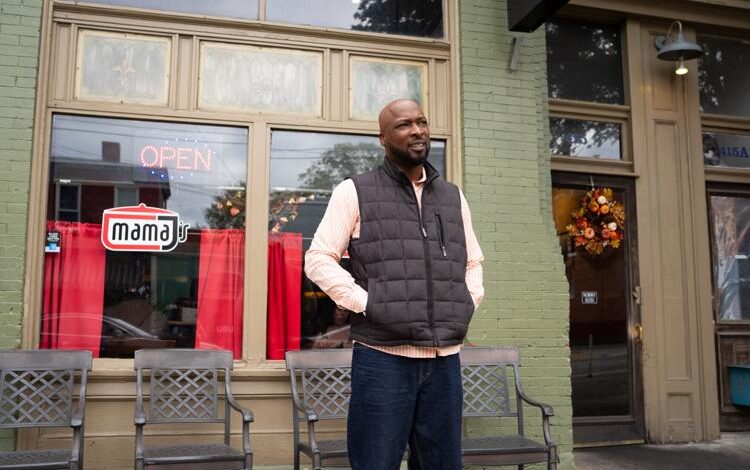Workers Facing Health Care Crisis Amid Government Shutdown

The ongoing government shutdown has created significant uncertainty for millions of workers relying on the Affordable Care Act (ACA) for their health insurance. This political impasse centers on debates over federal subsidies for health care coverage, which could dramatically impact small-business owners and self-employed individuals across various sectors.
According to the Kaiser Family Foundation (KFF), approximately 10 million adults covered under the ACA are small-business owners, their employees, or gig workers. These individuals often do not have access to the comprehensive health coverage that larger companies can provide, leading many to depend on government-subsidized plans. As the shutdown progresses, their futures hang in the balance.
Lester Johnson, co-owner of Mama J’s, a soul food restaurant in Richmond, Virginia, expressed frustration over the situation. He and his wife, Yolanda, rely on Obamacare for their family’s health coverage, currently paying about $700 a month. If proposed subsidy cuts by Republicans take effect, their premiums could exceed $1,400 monthly. “It’s a lot of money for people,” Johnson noted, highlighting the anxiety surrounding potential price hikes.
The political standoff has already begun to show its effects, with states beginning to announce significant increases in health care costs. For example, Idaho has reported that without extended subsidies, some recipients could see their monthly premiums rise by hundreds of dollars. This potential financial burden could prove politically damaging for Republicans, who have faced criticism for their stance on ACA subsidies.
Misconceptions surrounding who benefits from the ACA persist. Many assume that ACA subsidies primarily assist low-income individuals, when in fact, many recipients earn too much to qualify for Medicaid yet cannot afford private insurance. Nance L. Schick, a 56-year-old employment attorney in Norfolk, Virginia, emphasized the misconception. Without subsidies, she would face a yearly insurance cost of $12,000, a substantial portion of her expected $60,000 income for the year.
Research from KFF reveals that certain professions, including chiropractors, musicians, and real estate agents, see over a quarter of their workforce relying on ACA plans. Notably, nearly 60% of ACA enrollees reside in congressional districts represented by Republicans, with high concentrations in states such as Florida, Texas, and Georgia.
Cynthia Cox, a researcher at KFF, explained, “People have this caricature of those who get Obamacare. They are often working individuals whose jobs do not provide health insurance.” Small-business owners consistently rank health insurance costs as a primary concern, with many depending on ACA subsidies to survive.
John Arensmeyer, founder of Small Business Majority, stressed the importance of ACA for small businesses, noting their limited margins and access to capital. “For them, the ACA has been a tremendous benefit,” he said.
Under the ACA, small entrepreneurs and their employees are provided options for private health insurance plans, with costs subsidized by the federal government based on income. The Biden administration increased these subsidies during the COVID-19 pandemic, with extensions set to expire in December. Without further action, older enrollees and self-employed individuals could face steep premium increases. For instance, a typical 60-year-old couple earning $85,000 may see their annual premium payments soar by over $22,600 by 2026.
While Republicans have historically attempted to repeal the ACA, they argue that the subsidies were designed as emergency measures rather than permanent solutions. Extending these subsidies for an additional decade could cost the federal government around $350 billion, according to the Congressional Budget Office.
The implications of this political deadlock are real and immediate for workers like Francis Wright, a forklift operator in Richmond. Earning $21 an hour, he pays $104 monthly for his health coverage, a fraction of what it would cost without subsidies. “The politicians want to put the money in their own pocket,” he remarked, illustrating the frustration felt by many.
In the small business sector, owners like Ashleigh Tucker, managing partner of 4Corners Riversports in Durango, Colorado, have voiced their concerns. With all employees relying on Obamacare, Tucker joined others in urging Congress to extend the increased subsidies. “Having a premium that doubles is just not going to be doable for a lot of people,” she explained.
Rachel Rozner, who owns the Elden Street Teashop in Reston, Virginia, pointed out that many people simply cannot afford their own insurance plans. “For me, in starting this business, it was a game changer,” she said.
The stakes are high for many workers, including Teresa Hussein, a technical writer in the Richmond area, who pays $350 monthly for an Obamacare plan. As a diabetic, she emphasized the necessity of having health insurance, stating, “I have to have meds or I die.”
Keven Patchett, director of the ACA marketplace in Virginia, highlighted the impact of increased subsidies, which allowed over 40,000 workers earning between $20,000 and $30,000 to secure health insurance. Without these subsidies, many may have to choose between insurance and rent. “We have 400,000 Virginians who will see a meaningful increase in their rates,” he cautioned, warning of the potential for “sticker shock” among recipients.
As the government shutdown continues, the outcome for those relying on the ACA remains uncertain. Workers across the nation are closely monitoring the situation, hoping for a resolution that preserves their access to essential health care coverage.






